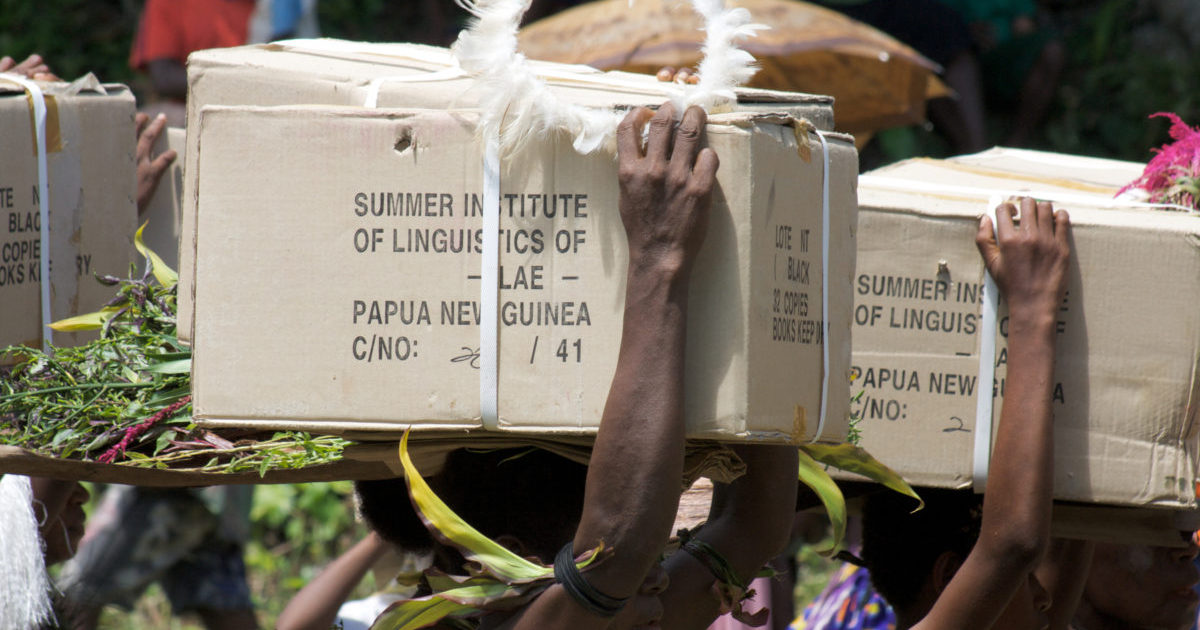
Women carry boxes containing the brand new Lote New Testament as part of the celebrations
Hebrews 4:12 says Scripture is “living and active, sharper than any two-edged sword, piercing to the division of soul and of spirit, of joints and of marrow, and discerning the thoughts and intentions of the heart.” The image is striking, even violent, but such is what it takes to overcome hearts marred by sin and blinded by the devil.
The power of Scripture itself is preeminently evident among people who receive it for the first time. Hundreds of millions of people still lack access to one verse of Scripture in the language they understand best. When they finally receive it, and read it and share it, God works wonders.
The Alekano Teacher
By the time Ellis Deibler finished the Alekano New Testament in Papua New Guinea, he knew of only two believers. For years he would return weekly to a market near the village to sell Bibles, often discouraged at the lack of interest.
One Saturday, an Alekano woman recognized him and thanked him for translating the New Testament. She had found a copy in a bookstore and had never seen anything written in her mother tongue, let alone the Scriptures. She began reading it, and testified: “While I read it, the Spirit of God came over me, and I knew I was different.”
All on her own, equipped with the Scriptures in her heart language, she began reading it to others. Many also experienced the Holy Spirit through their encounter with God’s Word.
Ellis asked her how many now believe because of this. She estimated at least 200!
New Ika Believers
In southern Nigeria, Ika was an isolated village, but had become a center for mission work due to its proximity to three different language areas. An American missionary Mr. Dibble had arrived there in 1921 and begun work on BIble translation into Igala.
During the Second World War, he was forced to leave the area. He left about half a dozen typewritten copies of his translation work in the hands of a small group of local Christians. When he returned after the war, he was astounded to find that during his absence, the local Christians had used the translation to such effect in spreading the good news that the church had multiplied beyond his dreams.
The few copies of the translation that survived were dog-eared with use, and bore eloquent testimony to the importance of new churches having access to scripture in their own language.
More Stories from the Field
There are many books out there that demonstrate the power of Scripture itself. One of the most entertaining and powerful for me has been David Clark’s account, Babes in the Jungle, from which the Ika account comes (pp. 130-131). Clark’s Of Islands and Highlands gives a more practical, every-day-agenda type of account that would help prepare your expectations for the mission field. Wycliffe USA also sells a book full of inspiring stories from their own missionaries. Videos are YouTube are also plentiful, such as the following that presents a tribe whose hearts used to be heavy, but now they are light.
I hope what we Westerners can gain from these stories is that church really doesn’t have to be that complex. The church growth movement has really jettisoned the centrality of Scripture–simply reading it together and obeying it together. Worship songs are filled with worship leaders’ private journal entries, attempts to coerce us into singing fraudulently about their personal feelings. Sermons take on felt needs from a perspective that often suggests not that the preacher wants his people to be more like Jesus, but that the preacher wants his people to think about the Christian life more like he does.
What Christians around the world teach us, though, is that God’s word doesn’t need our help. It’s powerful enough on its own. Get it to people clearly in a way they can understand–and yes even be creative and engaging–and God will work beyond our wildest dreams.

